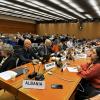News
Displaying Results 1 - 25 of 254
Ensuring the principles of environmental democracy are upheld in relation to modified organisms/genetically modified organisms (LMOs/GMOs) can help countries to address biodiversity loss and support progress on a number of Sustainable Development Goals, in particular Goals 2 (zero hunger), 15 (life…
The Protocol on Pollutant Release and Transfer Registers (Protocol on PRTRs) sets international standards for reporting on pollutant releases from a range of economic activities, such as mineral industry operations, plastic production, waste and wastewater management or the rearing of poultry or…
Transparency in the environmental performance of economic activities and effective public access to environmental information, especially on products, are indispensable in addressing pressing environmental challenges. This also supports a just transition towards a green and circular economy,…
The Mediterranean Region, home to over 510 million people, is an important crossroads for economic, social and cultural exchanges between Europe, Africa, Asia and other continents. The region is rich in biodiversity, but has come under pressure due to the intensive exploitation of mineral resources…
The European Commission has proposed a new legislation, the European Critical Raw Materials Act, to ensure a secure and sustainable supply of critical raw materials for the EU. The Act, on which the European Parliament and the European Council reached a provisional agreement on 13 November,…
The public and civil society have a crucial role to play in tackling key environmental challenges. To make the most of this potential, continued efforts are needed to uphold their rights to shape environmental decision-making.
To this end, the Working Group of the Parties to the Convention on…
For some time now, Uzbekistan has been engaged in various activities under the UNECE Convention on Access to Information, Public Participation in Decision-making and Access to Justice in Environmental Matters (Aarhus Convention).
An international round table entitled “Aarhus Convention: Effective…
Countries are increasingly facing multiple interlinked environmental, social, economic and health challenges – climate change, pollution from chemicals and wastes, biodiversity loss and species extinction, deforestation, land degradation, emerging zoonotic diseases, and the impact of armed…
At its seventy-seventh meeting (Geneva, 13–16 December 2022), the Compliance Committee of the UNECE Convention on Access to Information, Public Participation in Decision-Making and Access to Justice in Environmental Matters (Aarhus Convention) invited fourteen Parties to attend open sessions to…
The UNECE Protocol on Pollutant Release and Transfer Registers (PRTRs) continues to support actions to promote transparency in environmental matters across the globe. It drives the development of national legislation and practice towards a common set of international standards, bringing about…
During her recent two-day visit to Turkmenistan UNECE Executive Secretary Olga Algayerova spoke at international conference “Dialogue is a Guarantee of Peace” in Ashgabat and discussed areas of cooperation with the highest government officials, focusing on future circular, digital and green…
The tenth meeting of the Task Force on Public Participation in Decision-making under the Aarhus Convention (Geneva (hybrid), 10–11 October 2022) focused on effective public participation in decision-making in the context of the coronavirus disease (COVID-19) pandemic and on health-related issues…
The extreme heat and drought that the region experienced this summer is a bleak reminder that current commitments under the Paris Agreement and those made last year at COP26 are nowhere near what is needed to limit global warming to below 1.5°C. Inaction is a policy choice that will lead to greater…
Last week, Parties to the UNECE Convention on Access to Information, Public Participation in Decision-Making and Access to Justice in Environmental Matters (Aarhus Convention) gathered alongside representatives of civil society, international organizations, academia, private organizations and other…
As guests of the planet, we human beings can thrive only if our host environment is thriving. We are strongly connected to it, more than we probably understand and more than we probably dare to admit.
Conversely, the ways humans treat the environment has clear negative effects on our health and…
From the Sandoz chemical spill of 1986 in Schweizerhalle, Switzerland, to the rupture of a dam storing mine tailings containing cyanide in Baia Mare, Romania, 2000; and last year in Beirut, the explosion of ammonium nitrate stored in warehouse near residential areas, what these chemical and…
A 5-day event in Geneva will provide a platform for some 400 representatives of Governments, international organizations, civil society and other stakeholders to meet in a hybrid format and discuss achievements and challenges in the promotion of transparency, public participation in decision-making…
By Ms. Olga Algayerova, UN Under-Secretary-General and Executive Secretary of UNECE, and Ms. Elisabete Quintas da Silva, Head of Department, Sustainable and Efficient Use of Resources Operational Programme, Government of Portugal, and Chair of the UNECE Committee on Environmental Policy.
This…
Setting the major directions to strengthen effective public participation and access to information and justice by 2025 was the focus of the twenty-fifth meeting of the Working Group of the Parties to the Convention on Access to Information, Public Participation in Decision-Making and Access to…
Decarbonizing transport and mobility remains a critical policy challenge, for which we must seize the recovery from the COVID-19 pandemic as a unique opportunity to accelerate progress. Decarbonization is one example of an issue where transport, health, and environment all meet – an intersection…
Water, health, climate change and disaster risk reduction are interlinked and interdependent. For example, with climate change, floods and droughts increase in both intensity and frequency. Floods can damage water and sanitation infrastructure, disrupt essential public service provision, undermine…
Air Convention Task Force discusses impacts of COVID-19 lockdowns on air quality in the UNECE region
One year after the first COVID-19 lockdown in many parts of the UNECE region, scientists and experts are studying the effects of lockdown measures on air quality. A study from Germany showed that while levels of nitrogen oxides (NO2) measured at urban stations decreased during the lockdown in…
To reduce transmission of the novel coronavirus, Governments in the UNECE region introduced social distancing and other measures, which have often included restrictions on the freedoms of assembly and of movement. Consequently, there has been an impact on procedural rights of public participation…
Systemic deficiencies with regard to access to information, decision-making or compliance with environmental law can seriously threaten successful implementation of circular and green economy and sustainable development. Taking a case to court to advance a widely shared public interest remains an…
Directive (EU) 2020/2184 of the European Parliament and of the Council of 16 December 2020 on the quality of water intended for human consumption (recast) was adopted by the European Parliament and the Council of the European Union on 16 December 2020 and entered into force on 12 January 2021. The…

























